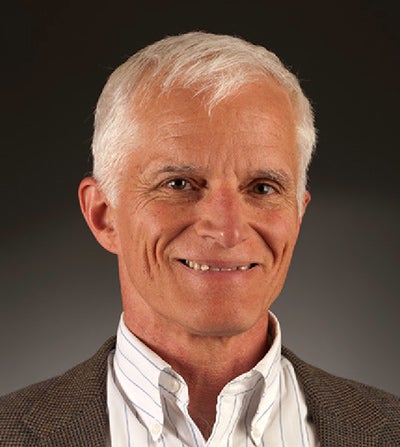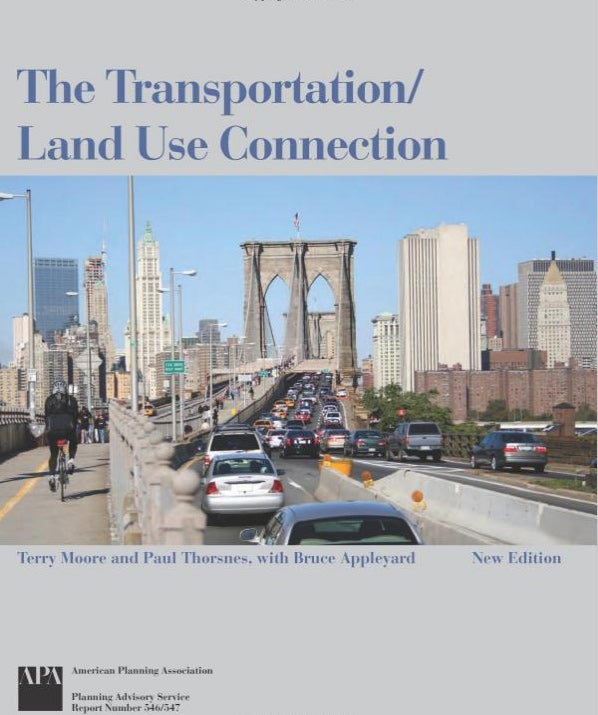master of urban planning '78, master of public administration '78
Moore’s writing guides national transportation, land-use planning
When one graduate of the Department of Public Planning, Policy, and Management arrived to deliver a lecture at Lane Community College in April 2014, his audience already knew who he was.
 The lecture, part of the LiveMove Speaker Series, was titled “A Better Way To Make Transportation Decisions.” An engineer from the City of Eugene approached the speaker, Terry Moore, and told him that Moore’s book, “The Transportation/Land Use Connection,” has played a key role in public planning since its publication in 1996 by the American Planning Association.
The lecture, part of the LiveMove Speaker Series, was titled “A Better Way To Make Transportation Decisions.” An engineer from the City of Eugene approached the speaker, Terry Moore, and told him that Moore’s book, “The Transportation/Land Use Connection,” has played a key role in public planning since its publication in 1996 by the American Planning Association.
The engineer said that after he’d been hired at a firm many years ago, his employers told him, “We’re going to make a planner out of you.” They handed him a copy of Moore’s book and told him to “get going.”
Moore’s book, which won the American Planning Association’s 1996 Current Topic Award for Transportation Planning, included articles on growth management, urban growth boundaries, project management, and planning theory. Moore says the book has had the biggest impact of his career’s many projects on transportation and land-use planning in the United States.
“Individual planning projects for local governments may have important local effects, but a book for the American Planning Association can influence transportation land-use planning everywhere,” says Moore.
Moore has written and published a number of articles and journals about land-use planning and transportation and has managed more than 500 planning projects since graduating from University of Oregon in 1978 with dual master’s degrees in urban and regional planning and public administration. His books and articles have been incorporated into planning courses at many universities around the country.
In 2013, PPPM honored Moore as a Distinguished Alumnus during an awards ceremony on the UO campus.
While a student at the UO, he enrolled in a seminar in urban economics from former UO professor Edward Whitelaw. Whitelaw later invited Moore to be a founding member at ECONorthwest, a firm that analyzes the economic implications of planning decisions. This includes contextualizing a planning scenario with a forward-looking, commercial view of its implementation and development.

Above: "The Transportation/Land Use Connection," Moore’s book for the American Planning Association, has played a key role in public planning nationwide since its publication in 1996.
“[Economics] is the common denominator for our consulting,” Moore says. “We take the principles of microeconomics, of demand and supply, of consumer behavior, and apply them to questions of public policy.”
Notes Whitelaw, “[Moore] excels at numbers and words. He remains solid, a great colleague, organized within the bounds of Newtonian reality.”
ECONorthwest earned a reputation for being quantitative, rigorous, and analytical, says Moore. The firm’s track record includes a wide range of work throughout Oregon and the country on land-use planning and environmental economics. Its work covers regional land-use and transportation planning, infrastructure investment, and environmental ethics. (For example, ECONorthwest estimated damages to fishermen and municipalities following the 1989 Exxon-Valdez spill in Alaska’s Prince William Sound.)
In addition to his extensive work with ECONorthwest, Moore has taught as an adjunct professor in UO’s PPPM department. He taught his first courses as a graduate student in 1977 and subsequently taught classes for 25 years on planning theory, planning methods, regional planning, growth management, land use, and transportation. In 2009 and 2011, he was a visiting scholar at the National Center for Smart Growth at the University of Maryland.
Moore notes that as a planner and a relatively logical and long-range thinker with an engineering background, he has done “about zero planning on [his] career.” He adds that A&AA’s influence on his career track has been significant.
“Once I made the decision to come to Oregon, got my degree, and stayed connected with the university, that created a path for my life that was really different than what it would have been otherwise.”
